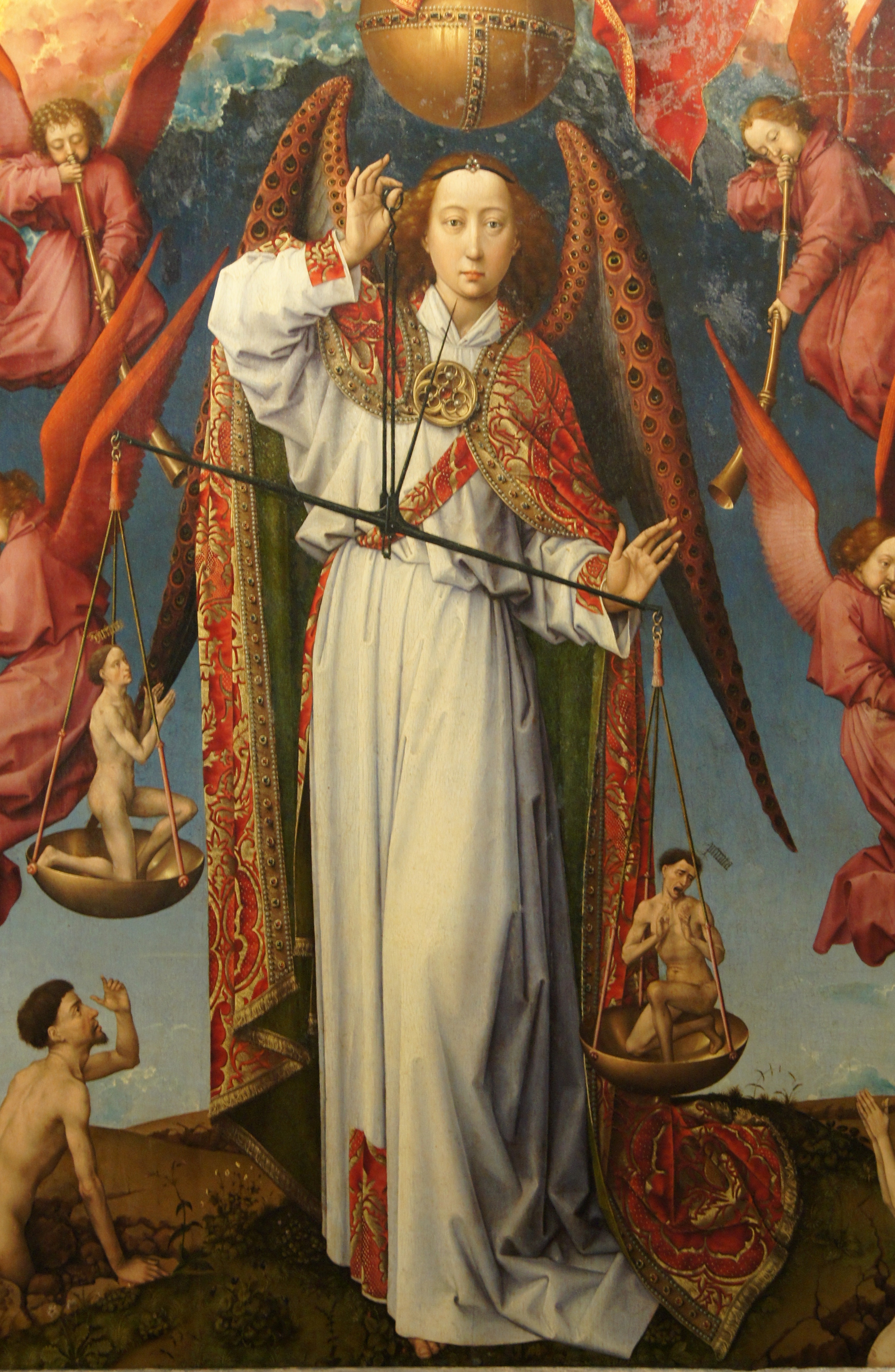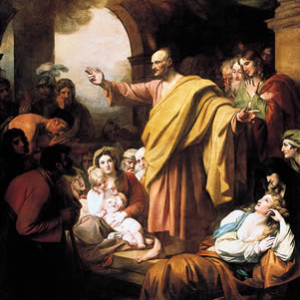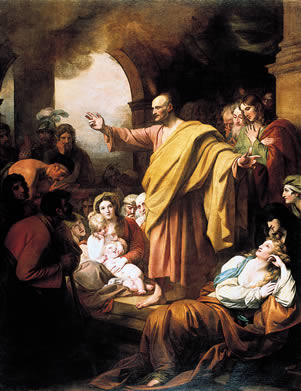One of the major differences Catholics and Protestants have is on the nature of the Church. Is the Church a visible entity founded by Jesus Christ, or simply the invisible collection of all of the saved? Bible.ca, for example, includes a series of lessons from Ron Boatwright, who argues that “Only The Saved Are In The Lord’s Church”:
Benjamin West, St. Peter Preaching at Pentecost (19th c.) In order to be in the one church the Lord established, those added to it by the Lord must be saved according to His requirements. In Acts 2:47 we read, “And the Lord added to the church daily those who were being saved.” The Lord only adds the saved to His church. There are no unsaved people in His church. The Lord makes no mistakes. We are not saved just because we think or say we are. We are saved only when we have done what God has said we must do. Jesus says in Matthew 7:21, “Not everyone who says to Me Lord, Lord shall enter into the kingdom of heaven, but he who does the will of My Father which is in heaven.” We must do God’s will, not man’s will, to go to heaven.
But, of course, Acts 2:47 doesn’t actually say that only the saved entered the Church. It says that the saved entered the Church, but doesn’t say, “these and only these!” In context, the passage is talking about the earliest believers, who respond to Peter’s message on Pentecost by getting Baptized (Acts 2:41), and are thereby joined to the Church: “Those who accepted his message were baptized, and about three thousand were added to their number that day.” But the idea that Baptism is the doorway to the Church is the Catholic position.
In any case, nothing in Acts 2 (or elsewhere) proves Boatwright’s claims that the “Lord only adds the saved to His church” or that there “are no unsaved people in His church.” In fact, Jesus explicitly teaches the opposite of this. In Matthew 13, Jesus lays out a series of parables describing the nature of the Kingdom of Heaven on earth, the Church. One of the clearest is the parable of the nets, Mt. 13:47-50:
“Once again, the kingdom of heaven is like a net that was let down into the lake and caught all kinds of fish. When it was full, the fishermen pulled it up on the shore. Then they sat down and collected the good fish in baskets, but threw the bad away. This is how it will be at the end of the age. The angels will come and separate the wicked from the righteous and throw them into the fiery furnace, where there will be weeping and gnashing of teeth.”
 |
| Rogier van der Weyden, Last Judgment (detail) (1452) |
That’s awfully clear, isn’t it? Right now, the Church consists of both the saved and the damned. At the end of time, at the Last Judgment, the damned will be weeded out of the Church, and thrown into Hell. This is why Boatwright can’t use Matthew 7:21 as a proof-text: it’s dealing with the Kingdom of Heaven in Heaven, after the Last Judgment. But Matthew 13 shows that this isn’t what the Kingdom of Heaven looks like on Earth, which is the dispute at hand.
Nor is this passage in isolation: shortly before this, Jesus used the parable of the weeds and the wheat, describing the Kingdom as a field with both wheat (the saved) and the weeds, and explaining (Mt. 13:40-41):
“As the weeds are pulled up and burned in the fire, so it will be at the end of the age. The Son of Man will send out his angels, and they will weed out of his kingdom everything that causes sin and all who do evil. They will throw them into the fiery furnace, where there will be weeping and gnashing of teeth.
According to Boatwright, the Kingdom consists of only the saved, and works don’t matter at all towards salvation. Jesus contradicts both of these claims. He clearly describes the Kingdom as needing to be weeded, and says that this won’t happen until the harvest (Mt. 13:30), which represents the end of time (Mt. 13:39). And some members of the Kingdom are thrown into the fiery furnace at the end of time. That doesn’t sound like salvation to me.
So I agree with Boatwright when he says that “The Lord makes no mistakes.” But the same cannot be said for those claiming the Church consists solely of the saved. What Scripture clearly describes in Matthew 13 and numerous other places is a visible Church consisting of both the saved and the damned, and entered into through Baptism.


Thanks for clarifying that. I never have and never will understand the protestant doctrine of being saved by faith only. It never made sense. Even the devil believes in God, and he’s certainly not saved.
The Church is three. All those in the “Church Triumphant” (Heaven) are saved. All those in the “Church Suffering”(Purgatory) will eventually be saved through purification. All those in the “Church Militant” (Earth) must justify themselves through faith and good works, and that is why our Blessed Lord says “Many are called, but few are chosen”. He is speaking of those members of the Church Militant who have been called to serve the Lord, but for whatever reason, some do not provide evidence of their faith in the lives they have lived, and undoubtedly do not make it to Heaven or Purgatory. This brings up the topic of who is a member of the Church Militant, and we then get into formal and informal corporate membership as described by Pius XII and Trent.
I have a couple reactions to this but, first: Joe, I appreciate that you have recently been addressing some of the nuances in doctrinal differences between Catholics and Protestants. I have learned a lot from this blog.
My understanding is that works follow faith. You tread in shallow water (forgive the pun) to say that Baptism is the doorway to the Church. Yes, Scripture makes clear that it is A doorway to the Church. I am of the opinion and understanding that a combination of your view and Boatwrights terminology draws a conclusion similar to Irenaeus. (Although, I have to say, Irenaeus lost me with his final reference.) But I don’t think I can state the Lutheran opinion any better than Ephesians 2. There’s even a great illustration of a “temple” or physical Church on Earth. I believe in two churches.
The visible Church (combination of the “Church Militant” and the “Church Suffering”) is made of all Christian people here on Earth. It’s by the loving grace of God and the sacrifice He made that every person is saved. That is to say, EVERYONE (infinitive) is already saved. Without any effort of our own, humanity is saved from damnation whether we choose to be or not.
Now comes the Lutheran works contradiction. I was taught to defend the statement that “Works don’t get you into heaven.” And in the same breath, we must accept God’s grace to be saved. If I’m understanding correctly, you’re stating that in order to accept salvation one must do so in accordance with a Sacrament. I guess I’m saying that confessing that “I have FAITH that my Old Adam has died and my sins have been cleansed by the sacrificial blood of Christ” is good enough.
I believe that a confession of faith in God’s Riches At Christ’s Expense is enough to get me into the “Invisible” or “Triumphant” or “Heavenly” Church.
The more time I am gifted with here in this physical Church, the more opportunities I will have to grow my faith (and help the Holy Spirit lead others to their own). This, of course, is done through works of discipleship, study, and sacrament.
I think I covered everything I wanted to say. Works follow faith, faith follows grace, grace was given to us by sacrifice and it is a GIFT. God bless
http://evepheso.wordpress.com/2007/07/26/ephesians-28-10/
sorry, but one quick clarification so as not to misunderstand. I said that the Visible Church is made of all CHRISTIAN people and then I followed that statement with something that could be misconstrued as a contradiction: Everyone is already saved by the gift of grace. Everyone is, therefore, a potential Christian. That’s what I was getting at. Every person, is saved. “The donut’s on the desk.”
http://pedicularis.blogspot.com/2008/04/donut-story.html
Joe:
I wonder if something might be said about the tense of Acts 4:27 “who were being saved.” As though they were undergoing a process of being saved, rather than “those who had been saved.”
God bless,
Mark Duch
Aaron,
The Church Suffering(Purgatory) is not visible. It is a place or condition of temporal punishment for those who, departing this life in God’s grace, are, not entirely free from venial faults, or have not fully paid the satisfaction due to their transgressions. My reference to formal and informal corporate membership can be demonstrated through the different forms of baptism. Baptism of Desire, Baptism of Blood, and Baptism of Water. In speaking on this Pope Pius says
“It is not always required that one be actually incorporated as [formal membership]a member of the Church, but this at least is required: that one adhere to it in wish and desire.[informal] It is not always necessary that this be explicit . . . but when a man labors under invincible ignorance, God accepts even an implicit will, called by that name because it is contained in the good disposition of soul in which a man wills to conform his will to the will of God.”
Pius XII (MYSTICI CORPORIS CHRISTI) Encyclical
Hey Joe, thanks for the post. In the parable of the field, isn’t the field actually the world, as it says explicitly in v. 38 of Matthew 13? Wouldn’t that mean everyone in the world? I see your point about weeding out those from “his kingdom”…seems like he’s saying two different things about what the field actually represents. If the field is the world, how can it also be the kingdom from which he weeds out ‘everything that causes sin and all who do evil’?
I REALLY DISAGREE because it seems you are totally missing the Protestant definition of “the Church” – just like the definition of Justification has caused a lot of pain in the rear…
The statement that only the saved are in the church is a sort of tautology, because the (general) protestant definition which appears to be used in the quoted passage is “the body of the followers of Christ” -i.e. those that are saved. So it basically says only saved people are in the church which is the totality of saved persons. No-brainer if that’s how you define it.
The protestant definition isn’t really talking about the institution of the church, but, as it were, the priesthood of all believers: it is a similar distinction by which Dante puts plenty of heretical popes in hell. The real question is whether a non-“Christian” i.e. heretical or damned person in the position of pope still has effect by the nature of the OFFICE he straddles…
I REALLY DISAGREE because it seems you are totally missing the Protestant definition of “the Church” – just like the definition of Justification has caused a lot of pain in the rear…
The statement that only the saved are in the church is a sort of tautology, because the (general) protestant definition which appears to be used in the quoted passage is “the body of the followers of Christ” -i.e. those that are saved. So it basically says only saved people are in the church which is the totality of saved persons. No-brainer if that’s how you define it.
The protestant definition isn’t really talking about the institution of the church, but, as it were, the priesthood of all believers: it is a similar distinction by which Dante puts plenty of heretical popes in hell. The real question is whether a non-“Christian” i.e. heretical or damned person in the position of pope still has effect by the nature of the OFFICE he straddles…
This comment has been removed by the author.
Oops… double-clicked or something…
Anyway, I just noticed that Calvin makes this distinction himself, of course supporting the need to go to the visible institutional church. “of course we believe in the invisible Church, evident to God’s eye alone, but we are also told to accept the visible Church and remain in communion with it” – Calvin, The Institutes
Oh, my God….why do the Protestants continue to deny the Visible Church under the Leadership of Peter the Rock, the Holder of the Keys of Heaven??????. Jesus was absolutely unambiguous when He spoke about His Church which will never be overcome by the Powers of Evil and which will remain to proclaim His Truth until the End of Time.
I’ve had the same frustrations myself with many protestants.
If the Church isn’t visible, how can one know where it is?
Why did/do people who persecute the Church throughout the ages demand a VISIBLE sign that one isn’t in the Church? From offering incense to the gods by the Romans, to the Japanese in more recent memory demanding Christians step on paintings of Jesus and the Virgin Mary.
There are also visible signs that separate Catholics from other Christian denominations, and that separate Christians in general from the rest of the world. Seeing someone with a Rosary in their hands, seeing someone making the sign of the cross with Holy water to name just a few.
Because man always thinks he knows better than God. People don’t want to be told what to do. They think they can figure it out on their own. That’s the alure of Protestantism. You can feel “spiritual” and create your own Church and interpretations out of thin air. If you don’t like an interpretation just leave that Church. Protestantism will never die because deep down we all want to be our own Pope, Priest and Church. It’s human nature to want to be like God.
Hi Joe, are catholics who don’t follow the teachings of the Church, e.g. use contraception, believe in abortion etc, weeds to be separated from the wheat or goats from the sheep. Do you believe they eill be burned of will they end up in purgatory for cleansing.
It depends on whether they die in unrepentant mortal sin. But none of us knows the state of the soul of another (whether they actually have committed a mortal sin) and should refrain from judging. See the Catechism of the Catholic Church, paragraph #1857 and surrounding for more details: http://www.scborromeo.org/ccc/p3s1c1a8.htm#1857
do you believe they will be burned or will they end up in purgatory for cleansing?
The formal membership of the Church Militant is visible for sure. But there is also informal corporate membership into the Mystical Body of Christ which is not visible.
Good points. I would also point to the example of 1 Corinthans 10:1-11, where Saint Paul uses the metaphor of the Exodus to show that not all baptized people will endure to the end.